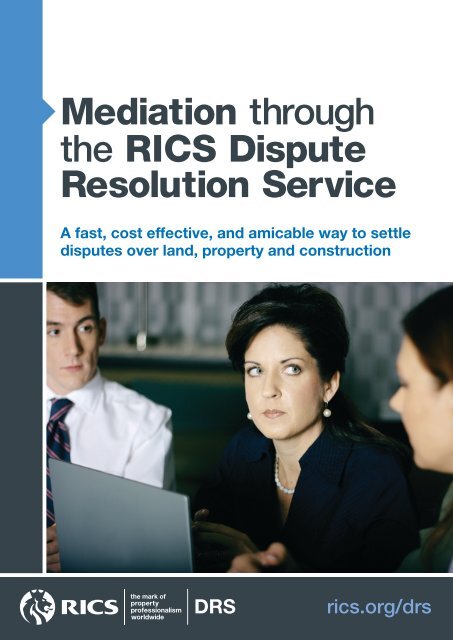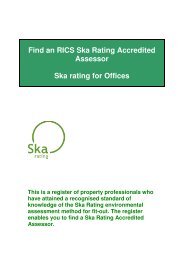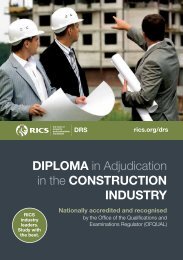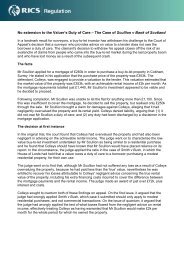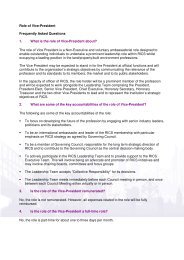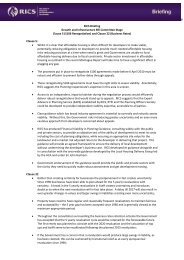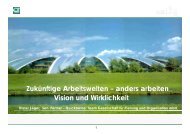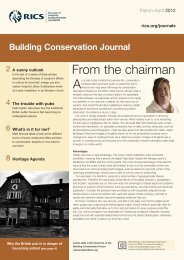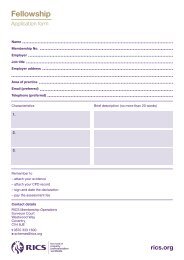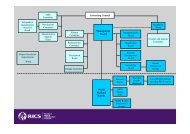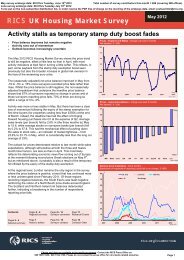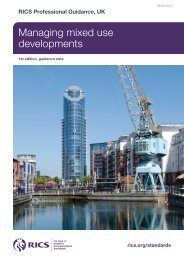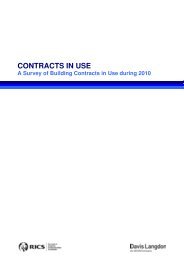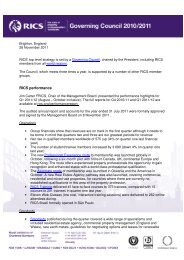Mediation Brochure - RICS
Mediation Brochure - RICS
Mediation Brochure - RICS
Create successful ePaper yourself
Turn your PDF publications into a flip-book with our unique Google optimized e-Paper software.
<strong>Mediation</strong> through<br />
the <strong>RICS</strong> Dispute<br />
Resolution Service<br />
A fast, cost effective, and amicable way to settle<br />
disputes over land, property and construction<br />
DRS rics.org/drs
Changes to Civil Procedure Rules require lawyers to<br />
consider the use of Alternative Dispute Resolution (ADR).<br />
<strong>Mediation</strong> is a form of ADR that gives parties<br />
control over how a dispute is resolved.<br />
It’s a quick, inexpensive, informal and confidential process<br />
that gives disputing parties an opportunity to work towards<br />
a solution that’s acceptable to all those involved.<br />
2<br />
Professional mediation is led by an impartial,<br />
specially trained expert with the skills to guide<br />
the parties involved towards a successful outcome.<br />
In this brochure you will find:<br />
• an introduction to the concept of mediation<br />
• examples of how mediation can work to help resolve property and construction disputes<br />
• details of how to refer a dispute to mediation through the <strong>RICS</strong> Dispute Resolution Service.<br />
What is mediation?<br />
<strong>Mediation</strong> is the name given to a confidential process whereby parties to a dispute invite<br />
an impartial, third party to facilitate negotiations between them with a view to achieving<br />
a resolution of their dispute.<br />
I can negotiate: why should I mediate?<br />
If negotiation leads naturally to a conclusion that is acceptable to all parties, there is<br />
no need to mediate. However, negotiations sometimes end in deadlock. A mediation<br />
session can break that deadlock.<br />
Why should mediation work where negotiation has failed?<br />
Firstly, negotiation tends to be confrontational. The parties perceive themselves to be<br />
opponents and each wants to ‘win’. However, a mediator will try to shift the dynamics<br />
of the negotiations away from positional bargaining towards principled negotiation,<br />
where the parties view each other as collaborators in a problem-solving exercise.<br />
In a mediation the parties are not ‘eyeball to eyeball’ across a table – rather they negotiate<br />
through a mediator who helps to introduce objectivity.<br />
Just as importantly, discussions with a mediator are held in private. The parties involved<br />
are able to share confidences with him/her, benefiting from the freedom to speak frankly<br />
about their true interests.<br />
Such openness affords the mediator a unique overview of the dispute and can help<br />
him/her identify ways in which the parties can satisfy their needs. Through questioning<br />
techniques and by suggesting options for consideration, the mediator can gradually<br />
help the parties to devise an agreement that will help to resolve their dispute.
Surely agreeing to mediate is a sign of weakness?<br />
Agreeing to mediate should not be seen as a sign of either weakness or strength – it is<br />
purely common sense. Simply, the message is “let’s talk and see if we can resolve this<br />
dispute in a way that satisfies our respective needs; avoiding the delay, expense and<br />
hassle associated with traditional methods such as litigation and arbitration.”<br />
The parties to a mediation have nothing to lose. The process is conducted on a ‘without<br />
prejudice’ basis and, if at any time, any of the parties involved feel unhappy with the<br />
direction the mediation is taking, they are free to leave the process. Should mediation<br />
fail, the participants can still choose to turn/return to litigation or arbitration.<br />
The preparation that they and their advisers have done for the mediation will still be useful.<br />
I have heard that mediation is non-binding –<br />
so what’s the point of it?<br />
This is a common misconception. It’s true that mediation is non-binding in the sense<br />
that entering into the process is voluntary, it involves no commitment to settle and the<br />
mediator has no power to impose a solution. However, when a mediated agreement is<br />
reached, the parties then sign the written agreement with the intention that it becomes<br />
a legally binding contract.<br />
Do I need a professional adviser?<br />
No – representing yourself is an option, although the experience of the organisations<br />
providing mediation services is that most parties do employ a professional adviser, for<br />
example, a chartered surveyor and/or solicitor or barrister.<br />
What cases are suitable for mediation?<br />
Any dispute is suitable for mediation provided the parties to the dispute are willing to try.<br />
Some cases are more suitable than others. Experience shows that multi-party disputes are<br />
particularly suitable for mediation, perhaps because they are often complex and the cost<br />
of sorting them out through more traditional techniques can be very high. The process is<br />
also especially well suited to disputes that have a long-term relationship to protect.<br />
3
4<br />
Examples of land, property or construction related issues which may<br />
be suitable for mediation include:<br />
• valuation, including rent reviews (especially where other issues may be involved)<br />
• building works<br />
• commercial landlord and tenant rights and obligations (eg dilapidations, service charges etc)<br />
• joint ventures and development agreements<br />
• disputes over residential leasehold obligations and restrictive covenants on title including<br />
contractor/employer and contractor/sub contractor relationships<br />
• disputes concerning professional fees or other aspects of professional appointments<br />
• professional negligence claims<br />
• partnership disputes<br />
• land boundary and other ‘neighbour’ disputes<br />
• local authority housing<br />
• disputes involving public bodies and national utilities such as compensation for compulsory purchase.<br />
These are only a few examples and, in practice, almost all disputes are suited to mediation. Even some<br />
international and cross-border disputes have been found to be appropriate cases for mediation.<br />
<strong>Mediation</strong> and the planning process<br />
Today, mediation is often used when disputes arise during the planning process.<br />
It can be helpful in a wide range of matters both simple and complex eg. neighbourhood planning,<br />
development management, negotiations on financial obligations and enforcement.<br />
However, using mediation does not remove the need to follow the statutory code; nor is it intended<br />
to avoid transparent lawful decision-making or to negate the role of committees in determining<br />
planning applications.<br />
<strong>Mediation</strong> can be designed to ensure that the important representational and decision-making roles of<br />
elected councillors are fully respected. It is compatible with the democratic planning process because<br />
it does not bind the decision-maker unless he/she/they are party to the mediation.<br />
<strong>Mediation</strong> can also be structured to take in third party interests such as neighbours and other interested<br />
parties or to include confidential exploration of individuals’ positions without infringing public law/third<br />
party rights.<br />
The process provides an opportunity for participants to discuss issues and resolve problems in a<br />
structured and non-confrontational atmosphere.<br />
Just as importantly, mediation can be cost-effective – the additional cost, primarily the mediator’s time,<br />
is paid for as agreed between the participants, either by one of the participants, or split.<br />
<strong>Mediation</strong> offers participants a real opportunity to save significant time and money, especially where<br />
appeals can be avoided.<br />
Extracted from: <strong>Mediation</strong> in Planning, a Short Guide by the National Planning Forum<br />
Does mediation work and if so, why?<br />
It is estimated that the mediation success rate exceeds 70%.<br />
<strong>Mediation</strong> works because, unlike traditional methods, it provides an opportunity for the<br />
parties to work together constructively towards a settlement. It also offers the chance to<br />
bring to a discussion elements that lie outside the original dispute but that can frequently<br />
lead to a resolution where both parties will gain from an agreement. A further benefit is<br />
that mediation can be conducted on a confidential basis, away from the glare of publicity.
Industry comment – from a <strong>RICS</strong> Accredited Mediator<br />
Solving a dispute over dilapidations<br />
“ Dilapidations<br />
disputes lend themselves well to mediation as well as any other –<br />
as long as the mediation occurs at the appropriate time. The essence of<br />
dilapidations is a breach of contract to repair, decorate or reinstate a leased<br />
property and for mediation to be effective, the extent and nature of the breaches<br />
needs to have been properly discussed by the respective surveyors to avoid<br />
mediation becoming a very expensive posturing or fact finding exercise.<br />
An interesting example can be given of a small industrial unit let on full repairing<br />
terms and then sub-let with limited repairing obligations due to a schedule of<br />
condition. The situation was further complicated by the discovery of steel corrosion<br />
in the reinforced concrete elements of the structural frame. The dispute, which<br />
had been fully discussed between the parties, revolved around the nature of the<br />
steel repairs and the extent of recoverability from the sub-tenant. No two parties<br />
were prepared to settle without the agreement of the third.<br />
<strong>Mediation</strong> was held with all three parties being present and proved to be extremely<br />
effective. A dispute that had run into the buffers when negotiations were<br />
exhausted 18 months earlier was resolved in less than six hours.<br />
”<br />
Edward Shaw, Director – Building Consultancy, Savills<br />
5
6<br />
Industry comment – from a <strong>RICS</strong> Accredited Mediator<br />
<strong>Mediation</strong>: the effective solution to service charge disputes<br />
“ Service<br />
charge disputes are difficult as they endanger the good relationship<br />
between owners and occupiers. Any form of adjudication means that one party<br />
will win and one will lose; therefore the chance of one being aggrieved and<br />
continuing to effectively engage in the working relationship is unlikely.<br />
In mediation the parties can stray outside the strict terms of the lease. They<br />
can agree practical methods for going forward which are solutions that are<br />
not available to a judge, arbitrator or independent expert when they adjudicate<br />
the dispute. <strong>Mediation</strong> allows the parties to address ‘cultural matters as well<br />
as the terms set out in the lease.<br />
One occasion where mediation will not work is where a decision is needed; for<br />
instance to interpret the meaning of the words of a lease. Here some form of<br />
external adjudication is needed.<br />
Finally mediation is substantially more cost-effective than arbitration, independent<br />
expert or trial at court.<br />
Whether the parties represent themselves or are advised, the cost of the mediator<br />
at a full day’s mediation is likely to be less than a £1,000 for each party, where<br />
typical costs of a day in court could well more than run at £10,000 plus<br />
preparation time.<br />
So what happens at a mediation?<br />
<strong>Mediation</strong> can be evaluative or facilitative.<br />
Evaluative <strong>Mediation</strong><br />
Early neutral evaluation means that a third party takes a look at the party’s<br />
arguments and advise the likely outcome in adjudication. This independent<br />
assessment lets the parties focus on the matters that are really in dispute<br />
and move forward to settlement.<br />
Facilitative <strong>Mediation</strong><br />
Here the mediator shuttles between the parties, testing the reality of each side’s<br />
position and looking at matters outside the strict legal interpretation of the lease<br />
and the real causes of grievance between them. Then, with the permission<br />
of each party, the mediator attempts to facilitate a settlement between them.<br />
This mediation is completely confidential (it cannot be used in any form of<br />
subsequent litigation). The mediator will only pass information from one side<br />
to the other when the express approval of the party has been granted to let<br />
the other side have that information. The parties are therefore in control, albeit<br />
they don’t necessarily spend time face to face with their opposite party. By shuttling<br />
between the parties, the mediator moves the matter forward and addresses<br />
the key issues.<br />
80% of mediations settle on the day or within two weeks of the mediation day.<br />
Whilst there is no guarantee of success, if the parties are genuinely willing to<br />
try there is a good chance that a satisfactory conclusion can be reached and<br />
matters settled allowing a sensible business relationship to exist going forward.
Time Limited <strong>Mediation</strong><br />
For smaller disputes, rather than have a full day for the mediation, it can be<br />
agreed that the mediation will only last say four hours and the costs therefore<br />
will reduce proportionately.<br />
Conclusion<br />
<strong>Mediation</strong> allows a third party, the mediator, to work with the parties and<br />
facilitate a settlement of the dispute. That settlement is something the parties<br />
have agreed, thus allowing relationships to be maintained – particularly in terms<br />
of future business. A mediation can stray outside the strict parameters of the lease<br />
and therefore find innovative and genuine solutions to the difficulties between<br />
the parties.<br />
”<br />
Chris Edwards, F<strong>RICS</strong> – Principal of Commercial Property Advisors Ltd.<br />
7
8<br />
How to refer a dispute to mediation through<br />
the <strong>RICS</strong> Dispute Resolution Service<br />
Step 1 – Agreement to mediate<br />
Contact <strong>RICS</strong> Dispute Resolution Service by writing to the appropriate address shown<br />
on page 10 or telephoning 0207 334 3806. If required, <strong>RICS</strong> will contact the other party<br />
to the dispute, or will discuss with one or both parties the mediation services available.<br />
No charge is made for this initial consultation.<br />
If the parties have already agreed to mediate:<br />
The parties should send <strong>RICS</strong> a statement to this effect. This statement should include<br />
all name and address details of the parties involved and any professional advisers. A brief<br />
summary of the nature of the dispute should also be included.<br />
<strong>RICS</strong> will respond by sending an application form for completion. This should be<br />
returned to <strong>RICS</strong> together with the standard administration fee payable for the<br />
appointment of a mediator.<br />
The President of <strong>RICS</strong> will then appoint a mediator and notify the parties.<br />
If the parties have not already agreed to mediation:<br />
Once an application for mediation has been received from the initiating party,<br />
<strong>RICS</strong> will contact the other party or parties seeking their agreement to participate.<br />
If any of the parties are unwilling to agree to the first request for mediation, the initiating<br />
party may then ask <strong>RICS</strong> to appoint a mediator who will re-contact the other party<br />
or parties with a view to securing their agreement to participate.<br />
Step 2 – Preparing for mediation<br />
Following the mediator’s appointment, he/she will liaise with the parties to arrange an<br />
appropriate date and location for the mediation and co-ordinate an exchange of case<br />
summaries between the parties and the mediator.<br />
When notifying the parties of the appointment, <strong>RICS</strong> will issue its standard form of<br />
<strong>Mediation</strong> Agreement to the parties and the mediator. This provides a framework in which<br />
the parties agree to the mediation process on a ‘without prejudice’, confidential basis.<br />
The mediator will bring the <strong>RICS</strong> <strong>Mediation</strong> Agreement to the first mediation meeting<br />
for signature by the parties.<br />
The fees and costs of the mediation will be agreed with the parties and must be paid<br />
before the mediation starts.<br />
A more informal procedure can be adopted in urgent cases or for preliminary meetings.
Step 3 – The mediation process<br />
One of the reasons why mediation works so well is that its format can easily be adapted<br />
to fit the circumstances of parties and their dispute. There is therefore no rigid procedure;<br />
mediations can be based on joint or separate meetings of parties and mediator, technical<br />
experts can be used alongside a mediator, and so on. The stages below describe a typical<br />
commercial mediation, often requiring only one day.<br />
The mediator will explain the procedure to be adopted at the first meeting with the parties.<br />
In most cases, mediation begins with an initial joint session with the parties during which<br />
each presents a summary of the case, and how they see it, to the mediator. The mediator<br />
may be assisted by a ‘Pupil’ who will already have undergone formal <strong>RICS</strong> mediator<br />
training (see below).<br />
The mediator will arrange a joint session for both parties to meet and agree the ground<br />
rules required to engender a productive discussion. Each party will be invited by the<br />
mediator to present their views of the dispute. The mediator will then manage the process<br />
to ensure that each party has an opportunity to speak without interruption.<br />
Several sessions of this kind may be needed for the mediator to become fully briefed<br />
on the background to the case, and each party’s views and interests. This is designed<br />
to facilitate detailed and candid discussion on the strengths and weaknesses of a case,<br />
as well as any options available to resolve the dispute. The mediator will explore these<br />
options and any settlement offers to be made, with each party.<br />
If agreement is reached, terms of settlement are drafted with the assistance of the<br />
mediator. Once finalised, these terms are normally signed by the parties with the<br />
intention of forming a legally binding contract.<br />
9
10<br />
If the mediator or any of the parties form the view that agreement cannot be achieved,<br />
the mediation will be ended or postponed to a future meeting. The mediator may suggest<br />
terms of settlement to the parties as a basis for future negotiation. Such suggestions are<br />
based on the mediator’s view of possible negotiated terms for settlement and are not<br />
a legal or expert opinion. At the request of the parties, the mediator may also assist the<br />
parties to draw up a settlement agreement.<br />
Step 4 – Follow up<br />
At the end of the mediation, <strong>RICS</strong> will send a follow up questionnaire to all parties<br />
involved, this questionnaire will provide valuable feedback and help <strong>RICS</strong> to monitor<br />
the performance of mediators appointed by the President.<br />
The mediator will then invoice the parties for any additional costs and expenses incurred.<br />
Who are the mediators?<br />
<strong>RICS</strong> holds a Register of Accredited Mediators. All Accredited Mediators included on the Register<br />
will have successfully completed training with <strong>RICS</strong> or a training provider that meets the requirements<br />
of the CMC.<br />
All <strong>RICS</strong> Accredited Mediators are also required to pass the <strong>RICS</strong> Assessment Day.<br />
<strong>RICS</strong> mediators have specialist expertise that enables them to open up discussions and provide a<br />
wider range of options. Their ability to mediate does not rely upon a specialist knowledge of the matters<br />
in dispute. However, <strong>RICS</strong> mediators do offer a wide range of experience of all aspects of land, property,<br />
construction and other disputes. They focus on personal, commercial and technical issues – not just<br />
legal matters.<br />
<strong>RICS</strong> appointments are made by the President of <strong>RICS</strong> from the panel of mediators. Panel Mediators<br />
will have passed the <strong>RICS</strong> Assessment Day and the requirements of the <strong>RICS</strong> interview panel.
How to apply for a mediator<br />
All applications for a mediator should be directed to <strong>RICS</strong> Dispute Resolution Service<br />
who will provide additional information.<br />
Please write to the appropriate address:<br />
England, Wales, Northern Ireland<br />
<strong>RICS</strong> Dispute Resolution Service<br />
Surveyor Court<br />
Westwood Way<br />
Coventry CV4 8JE<br />
t: (020 7) 334 3806<br />
f: (020 7) 334 3802<br />
e: drs@rics.org<br />
Scotland<br />
<strong>RICS</strong> Scotland<br />
9 Manor Place<br />
Edinburgh EH3 7DN<br />
t: (0131) 225 7078<br />
f: (0131) 226 3599<br />
e: jsneddon@rics.org.uk<br />
11
DRS rics.org/drs


